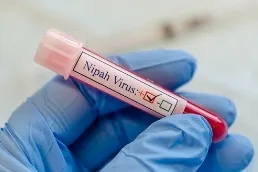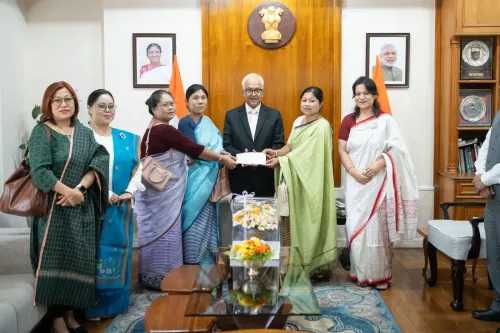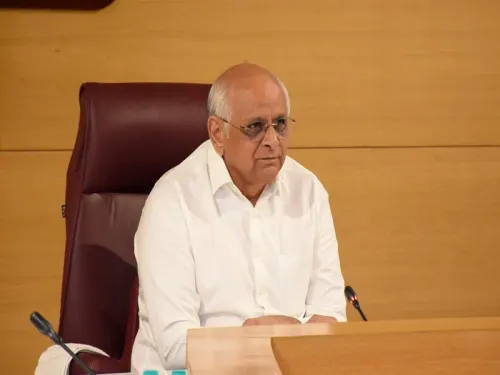Why are 425 individuals under surveillance in Kerala due to the Nipah virus outbreak?

Synopsis
Key Takeaways
- 425 individuals are under surveillance in Kerala due to Nipah virus exposure.
- Intensive efforts are being made to trace the outbreak's source.
- Healthcare professionals are among those being monitored.
- No vaccine exists for Nipah virus; only supportive treatment is available.
- Public awareness is crucial for preventing the spread.
Thiruvananthapuram, July 6 (NationPress) The Kerala Health Minister Veena George has revealed that 425 individuals are currently being monitored for potential exposure to the Nipah virus throughout the state. The largest concentration of contacts is found in Malappuram district with 228 individuals, followed by Palakkad with 110, and Kozhikode with 87.
Out of those on the contact list, one person has tested negative for the virus so far. Health officials are actively overseeing the situation and have implemented extensive surveillance and containment strategies in the impacted regions.
Intensive field operations are ongoing in Malappuram district to identify the outbreak's source and curtail its spread. Surveillance activities have taken place in 20 wards within the panchayats of Makkaraparamba, Kuruva, Koottilangadi, and Mankada.
A total of 65 teams have visited 1,655 households as part of door-to-door awareness initiatives and contact tracing. This survey was spearheaded by Dr. N.N. Pameela, with technical backing from C.K. Suresh Kumar, M. Shahul Hameed, and epidemiologist Dr. Kiran Raj. The findings have been compiled and submitted to the District Medical Officer, Dr. Renuka.
In Palakkad, one person is currently isolated, while 61 healthcare workers have been identified as close contacts. The health department has opted for local isolation, with only samples being sent for testing.
Route maps detailing confirmed cases in Palakkad and Malappuram have been shared to enhance public awareness and facilitate contact tracing.
All 87 individuals on the contact list in Kozhikode are healthcare professionals who might have been exposed while providing care or during response efforts.
To address the situation, ambulance services, including the Kaniv 108 fleet, are on standby. Fever surveillance has been intensified in the affected localities, and the Health Minister has stressed the significance of offering psychological support to those under observation.
Efforts to trace the source of the outbreak have also been heightened, with fruit bats, known carriers of the Nipah virus, again suspected to be the origin.
A high-level review meeting led by Health Minister Veena George took place in the district, attended by senior officials such as the Additional Chief Secretary of the Health Department, the NHM State Mission Director, the Director of Medical Education, Additional Directors, District Collectors, District Medical Officers, police officials, and representatives from various departments.
The Nipah virus (NiV) is a highly lethal zoonotic virus that spreads from animals to humans. It can lead to acute encephalitis (brain inflammation), respiratory distress, and frequently results in death.
This virus was first identified in Malaysia in 1999 and has since caused several deadly outbreaks in South and Southeast Asia. Kerala has reported six Nipah outbreaks, making it the most affected state in India.
The state’s inaugural outbreak in 2018, centered in Perambra, Kozhikode, resulted in 17 fatalities. Among the deceased was nurse Lini Puthussery, who tragically died after treating the index patient prior to a confirmed diagnosis.
Investigations later indicated that fruit bats, also known as flying foxes, were likely the virus's source. Nipah spreads through direct contact with infected animals (like pigs), consumption of fruits or palm sap tainted by fruit bats, and human-to-human transmission via contact with bodily fluids or contaminated surfaces.
Symptoms of Nipah infection encompass fever, headache, muscle pain, sore throat, vomiting, dizziness, drowsiness, altered consciousness, seizures, coma, and encephalitis.
Currently, there is no vaccine for Nipah, and treatment remains primarily supportive.
The Health Department has urged the public to stay vigilant, avoid consuming fruits damaged by bats, and seek immediate medical attention if symptoms manifest.









